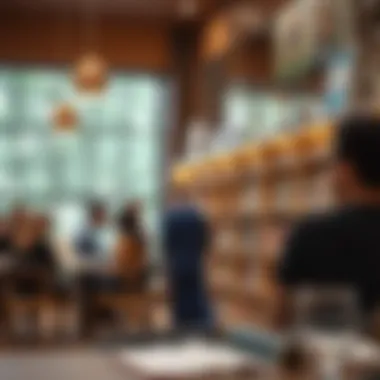Exploring the Libraries of Dubai: Cultural and Educational Hubs


Intro
Libraries in Dubai are not just dusty repositories of books; they are vibrant centers for learning and community engagement. With a rapidly evolving skyline and cultural landscape, the role of libraries reflects the dynamic spirit of this city. More than mere book collections, these institutions serve as cultural hubs, bridges between diverse communities, and exemplars of architectural innovation.
This exploration reveals how each library contributes uniquely to the educational fabric of Dubai. By embracing technology and innovative programs, these establishments invite residents to engage in lifelong learning. Beyond the shelves, they host cultural events, workshops, and lectures that cater to a wide array of interests.
As we delve further into the specifics, we'll uncover how libraries adapt to economic shifts, the trends shaping their investments, and their impact on property prices. Through a meticulous lens, you will understand why libraries are much more than educational spaces; they are vital components of the urban lifestyle in Dubai.
Foreword to Libraries in Dubai
Libraries hold a unique and indispensable role, acting not only as vessels of knowledge but also as cultural beacons within a community. In Dubai, this significance amplifies, as the city rapidly evolves into a global hub, both economically and culturally. With its eclectic population representing various nationalities, libraries here serve as bridges, knitting together diverse cultures through education and information sharing.
The Importance of Libraries
The essence of libraries goes beyond merely storing books. They create space for learning, inspire creativity, and provide access to information that enriches lives. Libraries are the heartbeats of communities, encouraging literacy and lifelong education. In a city like Dubai, where innovation thrives, having strong libraries enables residents to stay informed, engaged, and enriched.
- Cultural Exchange: Libraries offer programs that celebrate the art and literature of different cultures, fostering understanding and respect among the community's heterogeneous demographic.
- Resource Accessibility: Access to technology and various databases in libraries empowers individuals, giving them tools to navigate the fast-paced digital world.
- Community Programs: Libraries frequently host events that range from storytelling sessions for children to lectures from thought leaders, creating a hub for learning and interaction.
Overview of Dubai's Library System
Dubai's library system is growing and evolving at a breakneck pace. The emirate is not just focused on building structures; it seeks to craft spaces that serve as beacons of learning and knowledge exchange. The advent of technology has accelerated this transformation, making libraries more accessible and relevant than ever.
The system encompasses a mix of public libraries, university libraries, and specialized collections, each serving unique purposes:
- Dubai Public Libraries: These are strategically located across the city, designed to be easily accessible to communities.
- University Libraries: They cater to the academic needs of students and faculty, offering extensive collections and resources for research.
- Specialized Libraries: These include niche collections that focus on specific topics, such as the Mohammed bin Rashid Library, which is set to be a central resource for knowledge seekers.
This library network not only enhances the intellectual landscape of Dubai but also reflects the city's commitment to becoming a leader in education and culture. With initiatives aimed at fostering a literate and informed society, libraries in Dubai are invaluable resources, contributing to the evolving identity of this dynamic city.
The Architectural Marvels
Libraries in Dubai stand not only as repositories of knowledge but also as remarkable feats of architectural design. Their structures often reflect the city's blend of modernity and tradition, which speaks to Dubai's commitment to fostering education alongside artistic expression. In this section, we explore key architectural features that make these libraries unique and the iconic buildings that house them.
Key Architectural Features
The architectural design of libraries in Dubai includes several hallmark features. These buildings are not mere shelves of books; they are meticulously crafted environments designed to inspire creativity and facilitate learning. Here are some notable elements:
- Open Spaces: Many libraries feature expansive, open floor plans that promote a sense of community and encourage collaboration among visitors. Large windows allow natural light to flood in, creating an inviting atmosphere.
- Sustainable Design: With an eye on environmental responsibility, sustainable materials and energy-efficient systems are often incorporated into library designs. This demonstrates a commitment to both preservation and innovation.
- Cultural Integration: Architectural styles frequently draw inspiration from Emirati heritage, featuring motifs and intricacies reminiscent of traditional Arab architecture while seamlessly incorporating contemporary design elements.
These features not only enhance the usability of the libraries but also serve to elevate the experience of every visitor who walks through their doors.
Iconic Library Buildings
Several libraries in Dubai have gained recognition for their stunning architecture and innovative designs. Each building is not just a place to borrow a book but a landmark in its own right. Here are some standout examples:
- Mohammed bin Rashid Library: This library is a perfect representation of Dubai's ambitions—the design is both striking and functional. Its unique wave-like shape symbolizes the movement of knowledge and creativity, and it houses a vast collection of resources ranging from printed materials to digital media.
- Dubai Public Library: With multiple branches across the city, the Dubai Public Library system prioritizes accessibility. Their buildings often feature unique artistic touches, such as open-air reading areas and interactive installations, combining education with community engagement.
- University Libraries: The libraries associated with academic institutions like the American University in Dubai showcase cutting-edge facilities designed for research and study. Their architectural designs not only support the academic agenda but also foster a dynamic learning atmosphere.
Technology in Libraries
In the dynamic environment of Dubai, technology plays an ever-increasing role within libraries, redefining how individuals interact with information. It's not just about simply updating the stack with the latest bestsellers; it's about transforming libraries into accessible portals of knowledge. As Dubai undergoes rapid urbanization and digital transformation, libraries must adapt to these shifting landscapes, cultivating an atmosphere that encourages learning and discovery.


Digital Resources and E-Libraries
Digital resources have revolutionized the traditional concept of libraries. They provide an expansive reach beyond the physical confines, offering users immediate access to a plethora of books, journals, databases, and other learning materials. E-libraries, such as the Dubai Electronic Library, epitomize this shift. They facilitate seamless access to e-books, research papers, and multimedia educational content, allowing patrons to explore knowledge from the comfort of their homes or on the go.
Additionally, the ease of accessing digital resources means that libraries in Dubai can cater to a diverse range of linguistically and culturally varied populations. With the inclusion of multi-language platforms, the digital realm accommodates the needs of both residents and expatriates alike.
Benefits of Digital Resources:
- Accessibility: Patrons can access materials anytime and anywhere, cutting down on barriers that once restricted access to information.
- Cost-effective: Reduces the need for physical space and associated costs of maintaining large collections of paper-based resources.
- Up-to-date Information: E-resources can be updated much more readily than printed materials, ensuring that users have access to the latest data and trends.
Innovative Services Offered
Beyond merely housing books and e-resources, libraries in Dubai embrace innovative services that connect with the digital age. For instance, the concept of virtual reality (VR) learning environments is gaining traction. Libraries like the Mohammed bin Rashid Library are leading the charge by integrating VR technology to offer immersive educational experiences. This not only makes learning more engaging but also allows users to travel to virtual historical sites or interact with complex scientific models.
Other services include 3D printing workshops, coding classes, and technology boot camps which are part of the educational offerings aimed at all age groups. These initiatives promote practical skills development, redressing the gap in technological literacy.
Libraries are not just repositories of books; they are key players in shaping the digital literacy landscape.
In summary, the integration of technology in Dubai's libraries marks a significant turning point in the way knowledge is consumed and shared. Libraries are evolving from traditional institutions into multifunctional hubs that not only store information but also enhance communal learning experiences. As Dubai continues to push towards a tech-savvy future, the libraries within its metropolis are more crucial than ever.
Prominent Libraries in Dubai
In the bustling city of Dubai, libraries stand firm as bastions of knowledge. They are much more than mere repositories of books; they are community centers, cultural hubs, and gateways to a world of information. This section spotlights notable libraries within Dubai's landscape, emphasizing their distinct contributions to the society and the rich resource they provide for both residents and visitors.
Dubai Public Library Network
The Dubai Public Library Network plays a crucial role in fostering literacy and promoting a culture of reading across the emirate. With multiple branches strategically located throughout the city, these libraries provide accessible literacy resources to all citizens.
Library Locations
The locations of the Dubai Public Library are meticulously planned, ensuring that every neighborhood, from the glitzy towers of Downtown to the tranquil streets of Jumeirah, is served. The primary establishment features sprawling spaces filled with countless titles, and smaller branches often boast a local flavor, featuring community-specific resources. This widespread accessibility is integral to the mission of the library, as it aims to reduce barriers to education, ultimately enhancing community engagement. What makes these locations special is their commitment to the unique character of each community. For example, libraries in multicultural areas often have collections that reflect the diverse cultural fabric of their neighborhoods.
Services Offered
The services offered by the Dubai Public Library Network are comprehensive, catering to a wide variety of needs. From free access to digital resources, such as e-books and audiobooks, to workshops aimed at improving essential skills, these libraries are bustling with activity. A unique feature of these services is the library’s effort to engage youth – for instance, they host coding boot camps and creative writing courses. These offerings not only empower individuals with skills relevant to today's job market but also foster a love for learning. One disadvantage, however, may be the limited resources available in less popular branches. Still, the overall service model is commendable for its inclusivity and adaptability.
Mohammed bin Rashid Library
Mohammed bin Rashid Library stands as a landmark in Dubai, not only exemplifying architectural innovation but also serving as a cultural epicenter. It represents the UAE’s commitment to enhancing educational resources and enriching the community’s intellectual landscape.
Architectural Design
The architectural design of the Mohammed bin Rashid Library is a spectacle in itself. Its design, resembling an open book, symbolizes knowledge and enlightenment, creating an inviting atmosphere for visitors. What sets this library apart is its seamless integration of technology with traditional library spaces. This unique approach ensures that both digital and physical resources are easily accessible. Apart from its aesthetic appeal, the design also focuses on sustainability, utilizing natural light to create a warm environment while minimizing energy consumption. However, amidst all its grandeur, one might find that its vastness could be overwhelming for first-time visitors trying to locate specific resources.
Cultural Programs
The cultural programs offered at the Mohammed bin Rashid Library are diverse and cater to a multitude of interests. From book fairs to author talks that reflect both local and international perspectives, these initiatives foster a deeper understanding of various cultures and ideas. A standout feature is the integration of traditional Arabic storytelling sessions, connecting younger audiences with their heritage. This cultural engagement is essential for promoting tolerance and understanding in a multicultural society like Dubai. Some critics, however, might argue that the focus should be broadened to include even more contemporary issues facing the region today.
University Libraries
University libraries serve as the backbone of academic research in Dubai, significantly contributing to the higher education landscape. They not only house diverse collections but also provide essential support for students and faculty alike.


Role in Academic Research
University libraries play a pivotal role in academic research, serving as critical resources for students and faculty pursuing knowledge across various disciplines. Their extensive collections, both physical and digital, equip researchers with the materials necessary for in-depth study. Perhaps one of the most remarkable aspects of these libraries is their commitment to fostering a research culture. They offer specialized training on information literacy, helping students distinguish credible sources from misinformation in today's digital age. Challenges remain, though, particularly in the form of balancing resource availability with rising user demands amidst an ever-growing student population.
Collaboration with Local Institutions
Collaboration with local institutions amplifies the functions of university libraries, paving the way for enriched research opportunities. Partnerships with governmental archives and cultural organizations provide students and researchers access to unique resources that are otherwise unavailable. This synergy not only fosters a spirit of collaboration but also aids in preserving local heritage. A particular feature is the joint programs that encourage inter-institutional events, allowing for knowledge exchange and networking opportunities. However, there can be nuances in accessibility based on institutional affiliations, which can be a drawback for independent researchers or those affiliated with smaller organizations.
With all these prominent libraries, Dubai is shaping a future where knowledge is at the fingertips of its citizens. As it continues to evolve, these libraries remain dedicated touchstones in the city’s intellectual landscape.
Community Engagement and Programs
Libraries are often thought of merely as repositories of books and information. However, in Dubai, they transcend these boundaries to become vibrant community centers. They stand not only as a place for reading and study but also as a hub for community engagement, fostering connections amongst residents, and enhancing the social fabric of the city.
The importance of community programs and engagement in libraries cannot be overstressed. Libraries here are curated to meet diverse needs, drawing in different demographics—from children and teens to adults and the elderly. As the city evolves and grows, the role of these libraries becomes even more crucial in maintaining informed society and facilitating a sense of belonging.
Literacy and Education Initiatives
One of the shining aspects of libraries in Dubai is their dedication to literacy and educational initiatives. These programs aim not only to enhance reading skills but also to inspire a love of learning among community members. For instance, many libraries host literacy programs targeted at all ages, ensuring that everyone has the opportunity to improve their reading and writing skills.
Consider the various workshops designed for both children and adults. From storytelling sessions for young children that spark their imagination to adult literacy classes for those who might have missed the chance during formal education, the libraries are committed to making education accessible. Additionally, collaboration with schools enhances these initiatives, where libraries serve as an extension of the classroom.
Moreover, partnerships with local organizations and community leaders help in promoting these literacy programs. This not only brings awareness but also showcases the libraries’ role in bridging educational gaps within the community.
"Local libraries are at the frontline of ensuring that every resident can engage with literacy in an age-appropriate and relevant manner."
Cultural Events and Workshops
Cultural events and workshops represent another cornerstone of community engagement in Dubai's libraries. Beyond the stacks of books, libraries serve as venues for various cultural exchanges that reflect the city’s diversity. Special events such as author readings, book clubs, and art exhibits pave the way for residents to gather and share in the arts.
Workshops ranging from creative writing to digital storytelling enable participants to express themselves and share their uniqueness. Many libraries organize programs to celebrate diverse cultures through food festivals, traditional storytelling, and even language exchange sessions. These activities promote understanding and respect among different cultures, which is vital in a multicultural city like Dubai.
Additionally, by inviting local artists and speakers, libraries cultivate a sense of pride and community involvement. Visitors often look forward to these events, making libraries a lively cornerstone of social interactions. Such engagement not only enhances the knowledge of participants but also builds community ties that go deeper than mere transactional relationships.
Libraries and the Digital Age
In today’s fast-paced world, the integration of digital technologies into libraries is not just a trend; it has become a necessity. Libraries in Dubai are stepping up to the plate, embracing this digital age to serve their communities better. The shift towards digital not only caters to a tech-savvy population but also addresses the need for accessibility and convenience. As a cultural and educational cornerstone of the city, this evolution is significant in understanding how libraries continue to play a vital role in society.
Impact of Social Media on Libraries
Social media is a powerful tool that libraries have harnessed to bridge the gap between traditional resources and modern engagement. By using platforms like Facebook, Twitter, and Instagram, libraries in Dubai are reaching out to patrons, sharing their resources, events, and programs effectively. This presence on social media helps libraries cultivate community, transform patron relationships, and promote literacy initiatives without stuffy brochures.
For instance, during the recent pandemic, libraries utilized their platforms to host virtual events, guiding the community in accessing digital resources. The push towards e-books and online workshops led to increased participation in literacy campaigns, appealing to a broader audience. Social media isn't just another tool for libraries; it essentially broadens their reach to new generations. Given that younger users often turn to social media for information, libraries become relevant in the digital conversation.
"The role of libraries is not only to provide books but to foster a thriving community where information is shared freely across various platforms."
Trends in Library Technology Usage
The trends surrounding technology in libraries are evolving almost as rapidly as the technologies themselves. One notable trend is the use of electronic resources. Many libraries in Dubai are investing in e-lending platforms and digital encyclopedias, allowing users to access resources from the comfort of their own homes. This development saves time and encourages more users to engage with library services.


Moreover, many libraries are implementing user-friendly apps that provide patrons with easy access to catalogs and account management. These apps tend to include features like searching for titles, reserving books, and even viewing upcoming events.
Key tech trends in libraries include:
- Self-checkout kiosks: Streamlined borrowing processes, minimizing wait times.
- Virtual Reality stations: Offering immersive experiences for educational programs.
- Data analytics: Understanding user preferences to curate more tailored services.
- Robotics and AI: Helping manage inventory, freeing librarians to focus on patron interaction.
This technology adoption empowers libraries in Dubai to evolve alongside society, ensuring that they remain pertinent and of interest to all age groups. With these transformative changes, libraries not only hold the same cultural value but also adapt to serve their community's digital needs.
Future of Libraries in Dubai
The landscape of libraries in Dubai is on the cusp of a remarkable transformation, as the city itself evolves into a global hub of innovation and connectivity. Libraries, traditionally seen as repositories of books and knowledge, are now beginning to reshape their roles to meet the needs of a diverse populace. The future of these institutions is not just about storing information; it is about enhancing access to knowledge and nurturing community interactions. This shift is paramount, especially in a rapidly changing urban environment such as Dubai.
The importance of the topic of the future of libraries extends beyond mere literary considerations. It circles around adapting to the needs and expectations of modern society. Libraries in Dubai are increasingly tasked with becoming dynamic spaces that facilitate learning, encourage collaboration, and provide digital resources. This shift has several benefits including fostering a more informed citizenry and promoting cultural exchange within the community.
Adaptation to Changing Needs
In order to stay relevant, libraries in Dubai are embracing adaptability as a core principle. The needs of the community are evolving—demographics are shifting, and technology is advancing at breakneck speed. Libraries can no longer afford to maintain a static approach. Instead, they must actively seek to understand the changing landscape and proactively adjust their services and offerings.
For instance, as online learning becomes more prevalent, libraries are equipping themselves with digital platforms that not only allow access to books but also a plethora of e-learning resources. Additionally, they are incorporating co-working spaces and makerspaces that foster creativity. This is essential, as these environments can empower individuals to collaborate and innovate.
- Programs tailored for teens and young adults
- Workshops on digital literacy and coding
- Multilingual services to cater to Dubai's diverse population
As libraries take on these new roles, their physical spaces may also be redesigned to be more welcoming and functional. Instead of rows of stiff bookshelves, the libraries might feature comfy lounges and technology hubs equipped with high-speed internet. This approach reflects a commitment to creating environments sharply attuned to user needs.
Sustainability Initiatives
Sustainability, both environmental and social, is another focal point for the future of libraries in Dubai. With the global climate crisis bearing down on cities, libraries are uniquely positioned to lead by example in their communities. Integrating sustainability into their operations not only reflects responsible stewardship; it also resonates with the values of eco-conscious visitors.
Libraries can implement several initiatives to promote sustainability:
- Green Building Certifications: Designing new library buildings to meet green standards such as LEED (Leadership in Energy and Environmental Design) or Estidama.
- Recycling Programs: Offering drop-off points for recycling not only reduces waste but also educate the community on proper disposal practices.
- Sustainable Resource Management: Creating systems to maintain energy-efficient lighting and climate control.
"The role of libraries extends beyond books; they are vital players in building awareness for sustainable practices in their communities."
Moreover, the libraries can serve as community hubs for environmental education. Workshops, talks, and exhibitions can be organized to inform and engage the public about local and global environmental issues. By hosting initiatives that advocate for sustainability, libraries cultivate a connection between the community and environmental advocacy, fostering a sense of responsibility and enabling actionable change.
As they stride into the future, libraries in Dubai have the potential to emerge as vibrant, adaptable, and sustainable spaces that embody the spirit of the times, serving as beacons of knowledge and community engagement. It is imperative that the future holds a place for these institutions, continuously shaping and reshaping what a library can be.
Closure and Reflections
As we draw this exploration to a close, it's essential to reflect on the multifaceted role libraries play in Dubai's unique cultural and educational landscape. Libraries are not just repositories of books; they’re dynamic hubs of knowledge and community engagement. This article has illuminated the architectural splendors, the integration of technology, and the community programs that define Dubai's libraries, revealing their profound impacts on society.
Summarizing the Impact
Libraries in Dubai serve as critical access points for information and learning, addressing the needs of a diverse population. They provide resources that extend beyond traditional media, offering digital access and innovative services that cater to a tech-savvy generation. For instance, the Mohammed bin Rashid Library is more than a physical space; it's a testament to the city’s commitment to fostering a love for reading and research. With its vast collections and cultural programs, it draws in not only residents but also visitors from around the globe, making it a beacon of knowledge in a bustling metropolis.
The impact of these institutions can be summarized in several key areas:
- Cultural Enrichment: Libraries host programs that celebrate local heritage, literature, and arts, fostering a deeper connection among community members.
- Educational Resources: They support lifelong learning, from early literacy initiatives to research assistance for university students, ensuring that everyone has a chance to grow intellectually.
- Community Engagement: By organizing workshops, lectures, and events, libraries bridge gaps between different cultural backgrounds, promoting inclusivity and understanding.
Each of these points underscore the invaluable contributions libraries make to society in Dubai, reinforcing their importance in the fabric of community life.
The Role of Libraries in Society
Libraries hold a special place in society’s framework; they act as equalizers in education and information access. In a city characterized by rapid growth and change, like Dubai, libraries play a pivotal role in adapting to societal needs. They are institutions that invite not just the pursuit of knowledge, but encourage dialogue and intellectual curiosity.
Moreover, they can be viewed as reflective mirrors of the society they serve. Libraries accommodate a wide range of voices and perspectives, making them essential for fostering critical thinking and civic engagement. As the city continues to evolve, the roles of these libraries will likely expand, encompassing more digital realms and addressing emerging social issues.



